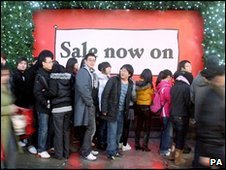|
By Russell Hotten
Business reporter, BBC News
|


Shoppers are facing shortages in the variety of available designer brands
|
Industry forecasts are showing a lack of designer brands emerging on the UK high street. British consumers pay 48% more on average while making purchases than what Americans pay for similar products, a survey conducted by Business Age. Although the survey was conducted on general items, it did reveal that designer goods also fall in the same category. Some of the luxury brands examined in the research include handbags, stiletto’s, jackets, travel baggage, jeans, scarves and belts. However, a group of market analysts, including Euromonitor, have come forward to state that the sticker prices in the US are not the actual prices – once the local and state taxes are added, the prices between these two countries do not have a greater disparity. Sticker prices In a bid to prove this claim, Andrew Rendle, the lead market researcher at UK based fashion outlet fashdock.co.uk led a retail price comparison research for five different products in 4 shops; 2 in UK and 2 in US. Rendle says that for the comparison to be unprejudiced, local and state taxes wherever applicable were included in sticker prices. He said that “Since these two taxes vary from state to state, we requested for no tax bargains and just used what was provided.”
He goes on to say that “From our findings, whether sales taxes are included or not, consumers in UK have to go deeper into their pockets each time, paying up to 48% more. All the products compared in our research turned out to be cheaper in the US, and some by a greater margin.” He added that, “The disparities in the prices are actually down to the pricing of manufacturers rather than taxes and foreign exchange rates.”
Transportation
Several companies have come forth to explain the differences in prices. Senior analyst at iTech, Chris Price says that major factors contributing to the great prices of luxury brands in UK are tax and import tariffs. British consumers have to pay an inclusive Value Added Tax of 20%. Price also commented on the import tariffs, saying that UK levy taxes on certain items while others are exempted. Clothing and accessories are in the exemption category. The final prices of designer goods such as handbags, belts and jackets are not affected by Custom Duty. However, representatives of the UK based designer brand retailer feel that this is not enough to help reduce luxury brand prices. Rendle Andrew added that the overall wholesale import prices have continued to increase by 10.6% despite the exemption of luxury branded products from Customs Duty. He says that, “Considering the exchange rates, companies are justified in their bid to protect themselves from the falling foreign currencies. This may partly explain the cause of higher prices in the country as far as most of the leading manufacturers based in the US are concerned.”
Some companies have attributed the disparities in prices to the cost of running business in UK. According to David Wilson, head of Burberry in UK, “it’s cheaper to carry out business in US than in UK.” But Richard Wilding, a professor at Cranfield School of Management has a different perspective regarding this. He says that “a large handbag would cost less to transport to a UK shop from a Chinese factory, which simply means that transporting smaller accessories such as designer belts would cost about 50% of the expense. This clearly shows that the difference in the transportation cost isn’t a reason enough for the extortionate prices of designer clothing on our end.”
An alternative outlook?
On other hand, the imports into China have recorded drops for the 12th month in a row, raising further concerns about the Chinese economy. China recorded a decline in its imports by 18.8% in last year. According to a HSBC analyst, Steven Pelayo, the slowdown in China’s economy is taking place at a faster rate than anticipated. He says that “It actually begun during the last quarter of 2014 and by July this year, denim manufactures realised that they were trading in excess inventory.” From his statement, it seems as if fashion accessories industries in the country are also affected. As the country moves from an export dependent to a consumer-led economy, Exane BNP Paribas analyst, Luca Solca points out that new potential issues are arising from it. He says that “the most important aspect of risk for consumer goods in our own view is that of declining import duties getting replaced by the higher taxes. This could mean that imports from China to consumers in UK is likely to decrease. ”
|





Bookmark with:
What are these?